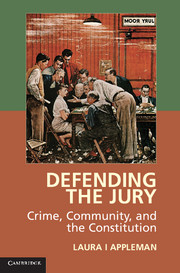Book contents
- Frontmatter
- Contents
- Acknowledgments
- 1 Introduction
- Part I History in the Crucible: Rediscovering the Original Community Right in Criminal Justice
- 2 The Collective Jury Right and the Sixth Amendment
- 3 The Supreme Court and the Reaffirmation of Community
- Part II Old Becomes New: Sixth Amendment Jury Rights and Twenty-First-Century Criminal Procedure
- Part III Theory into Practice: Origins and Community in Modern Criminal Procedure
- Selected Bibliography
- Index
- References
2 - The Collective Jury Right and the Sixth Amendment
Published online by Cambridge University Press: 05 April 2015
- Frontmatter
- Contents
- Acknowledgments
- 1 Introduction
- Part I History in the Crucible: Rediscovering the Original Community Right in Criminal Justice
- 2 The Collective Jury Right and the Sixth Amendment
- 3 The Supreme Court and the Reaffirmation of Community
- Part II Old Becomes New: Sixth Amendment Jury Rights and Twenty-First-Century Criminal Procedure
- Part III Theory into Practice: Origins and Community in Modern Criminal Procedure
- Selected Bibliography
- Index
- References
Summary
When we discuss the role of juries and the rights of the community in modern criminal justice, we must understand the precise contours of our modern jury trial right. Our historical Sixth Amendment right to a jury trial has been misapplied and misunderstood, and, as a result, too easily dismissed. Contrary to popular understanding, the original jury trial right was not an individual right, but a community one. We need a proper understanding of the Sixth Amendment jury trial right to provide both historical and constitutional justification for the community’s involvement in criminal justice. Thus, fully comprehending the collective nature of the jury trial right is critical to our project of incorporating the community right into current criminal process.
Much of our current understanding of the community jury trial right relies on a recent spate of Supreme Court decisions revitalizing the Sixth Amendment right to a jury trial and making the jury trial right central to criminal justice. Although these recent decisions reinvigorating the collective right to jury trial have prompted a large-scale rethinking of sentencing and punishment, we are still lacking proper historical and scholarly support for these changes. In response, Part I of the book provides a missing historical and constitutional justification for the Court’s fidelity to the community as arbiter of punishment and traces the evolution of the jury trial right through the modern day. First, Chapter 2 offers a textual-historical reading of the Sixth Amendment based on seventeenth- and eighteenth-century legal theory, linguistic usage, and colonial and Revolutionary practices, and concludes that the jury trial right was originally the community’s right, not an individual right. Bringing the discussion to the modern day, Chapter 3 provides an overview of why the Sixth Amendment jury trial right has recently reassumed great importance in criminal procedure and explains how and why the Court’s primary focus has been on the role of the jury as a critical voice of the community.
- Type
- Chapter
- Information
- Defending the JuryCrime, Community, and the Constitution, pp. 13 - 38Publisher: Cambridge University PressPrint publication year: 2015
References
- 1
- Cited by



